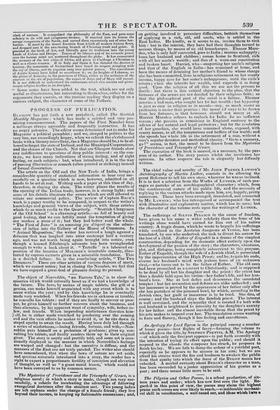PROGRESS OF PUBLICATION.
GLASGOW has put forth a new periodical, called The Scotthh Monthly Magazine ; which has made a spirited and very pro- mising commencement. The papers of the First Number form a mélange always agreeable and frequently instructive. It has no angry polemics. The editor seems determined not to make his Magazine a political pamphlet ; and we, steeped in politics to the very fins, are exceedingly happy, when we refresh the o'erlaboured brain with a literary miscellany, (as a Magazine should be,) to be al- lowed to forget the state of Ireland, and the Municipal Corporations, and the abuses of the Church. Not that our Glasgow friends show any indifference to questions of deep public interest : on the con- trary, we have many indications of strong feeling, and of right feeling, on such subjects : but, when introduced, it is in the way of passing illustration or remark (often pointed or striking) instead of formal dissertation.
The article on the Old and the New Trade of India, brings a considerable quantity of statistical information to bear very suc- cessfully on a question which is now, however, admitted on all bands to be set at rest. Writing such a paper at this time of day, therefore, is slaying the slain. The writer places the results of the opening of the Indian trade, however, in a strong light; and some of his details illustrate the errors which are still allowed to vitiate our commercial policy. The review of Captain BACK'S work is a paper worthy to be compared, in respect to the writer's knowledge and general `views of the subject, with those articles which do so much credit to the Quarterly. "Scottish Clergymen of the Old School" is a charming article,—so full of beauty and good feeling, that we can haIdly resist the temptation of giving our readers a piece of it ; but they had better read the whole. " The First of June" is an amusing jeu desprit on the admis- sion of ladies into the Gallery of the House of Commons. In "Animal Magnetism," the writer has revived a laugh against a delusion that was laughed into utter contempt half a century ago, and was not worth being again brought into notice, even though a learned Edinburgh advocate has been wrongheaded enough to write a book about it. " Tartuffe " is a laboured ex- position of the beauties of MOLlERE'S inimitable comedy, illus- trated by copious extracts given in a miserable translation. This is a decided failure. So is the concluding article, " The Two Dreamers." There are other articles of various degrees of merit, which we cannot notice; but in closing the Number, we feel that we have enjoyed a great deal of pleasure during its perusal.


























 Previous page
Previous page